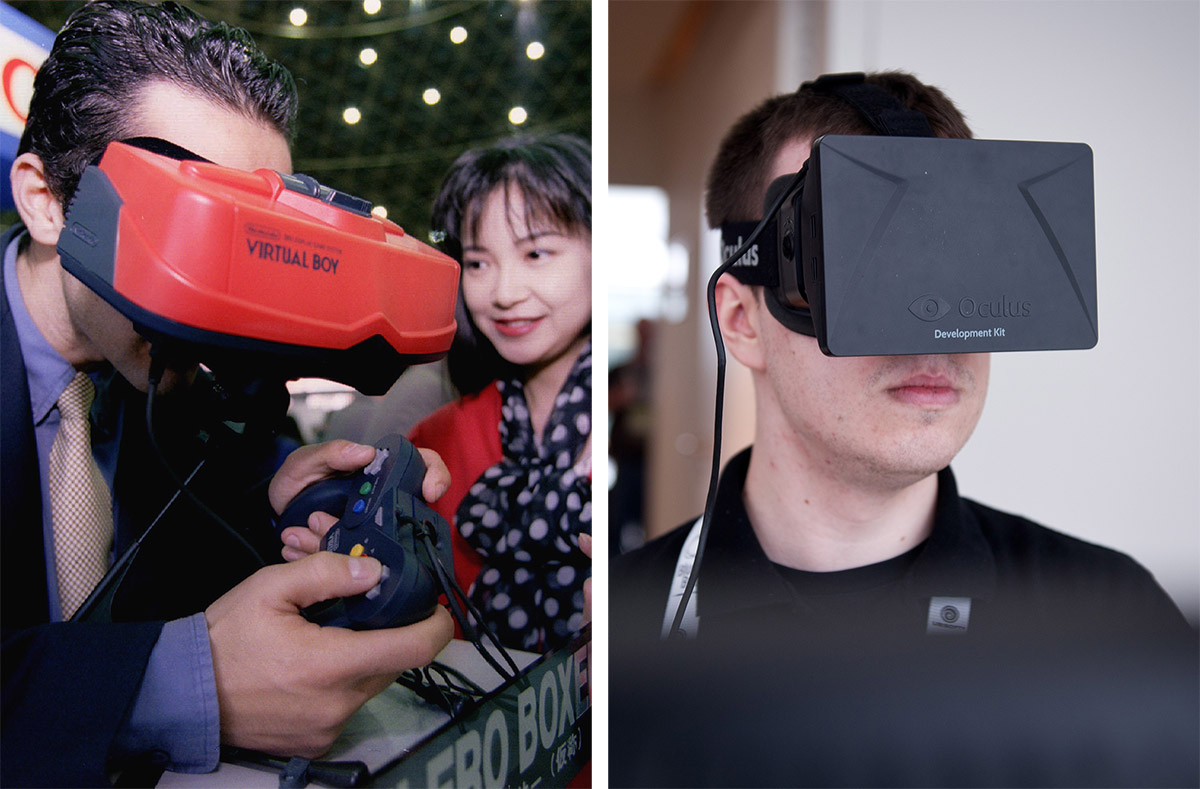Correction appended, Oct. 28.
Putting on a virtual reality headset feels a little like wearing the gaudiest pair of sunglasses ever: they’re awkward, unflattering — but they somehow manage to be kind of fun. Earlier this month, I was given the opportunity to try an Oculus Rift in one of TIME’s meeting rooms, sampling some imagery from Zero Point, the first movie ever shot in 3D, 360 degree video specifically for virtual reality.
I was transported to a whole new world.
I found myself in different settings — a virtual prairie surrounded by buffalos, a beach with a beautiful woman, and finally a military training session. The experience was a little overwhelming at first, but it didn’t take long for me to get used to it. It seemed that my brain was able to accept the virtual world almost as easily as it does the real one. When I finally returned to the conference room, though, it all seemed a little underwhelming.

The film Zero Point follows the pioneers, researchers, and developers of virtual reality, and is spearheaded by Danfung Dennis’s tech startup Condition One. The film uses footage from between three and 30 cameras, each shooting simultaneously at a slightly different angle, before being stitched together to create a seamless user experience. To view this film, you must own an Oculus Rift headset, which is currently only available to developers.

Facebook’s recent $2 billion acquisition of Oculus VR, creators of the virtual reality headset Oculus Rift, has spurred a massive resurgence of interest in virtual reality technology. For decades, the gaming industry has unsuccessfully attempted to introduce immersive headsets, but only now is the technology reaching a point where it can be used as a new documentary tool.
“The traditional rules of filmmaking and storytelling do not apply,” Dennis tells TIME. “There is no frame and it’s actually the audience or the user who’s deciding the frame and what’s of interest to them.”
“Anything that helps storytellers create more understanding and empathy for the people and issues that we are covering is worth exploring,” adds Brian Storm, founder and executive producer of the multimedia production studio MediaStorm. “It may take some time, but it’s clear that important storytelling can be elevated in the virtual reality space.” Indeed, the immersive experience may make room for a deeper connection between the viewer and the content – even an emotional one.
Similar technologies are already being used by the military to create flight simulators, and by doctors to practice surgeries. Ford uses it to assist designers in developing car prototypes, and NASA has been experimenting with controlling robots remotely and even simulating walks on Mars.
Dennis and his team have equally grand ambitions for virtual reality. They see it as a way to connect people to current events by using it in breaking news situations; ones that the general public lacks personal connection to. Of course, these aspirations will have to contend with the exorbitant price tag currently associated with the production of these visual experiences.
Beyond breaking news, Dennis also imagines the technology could be introduce to schools to expand on the classic curriculum: “They’re not reading a textbook about ancient Rome,” Dennis says, “They’re in ancient Rome.”
Dennis would also like to direct nature documentaries on pressing ecological concerns, with the goal of putting viewers in remote areas of high biodiversity. Places that “are threatened by deforestation or coral reefs that are acidifying and disappearing, or species that are on the brink of extinction,” he says. “Distill really complex, abstract problems that humanity is facing into experiences that we understand.”
For Dennis, even that is just a starting point. Eventually we will want more than to simply look around, he says. “We’re going to want our bodies in there, our hands in there. We’re going to be able to stand up, start walking around a scene, moving around it. That’s going to be mind-blowing.”
Dennis agrees that a fully immersive virtual experience might seem scary, even dangerous, to some, but he believes that temporarily imitating reality to the fullest extent is a natural urge, at least for him.
And yet, there is a great deal of software innovation necessary to bring even his simplest technological ideas to fruition, but for the first time it seems a matter of when and not if.
Correction: The original version of this story misattributed a quotation. It was Brian Storm, founder and executive producer of the multimedia production studio Media Storm, who said, “Anything that helps storytellers create more understanding and empathy for the people and issues that we are covering is worth exploring. It may take some time, but it’s clear that important storytelling can be elevated in the virtual reality space.”
Zero Point is an immersive film created by Condition One for the Oculus Rift. It is now available for PC on Steam.
Danfung Dennis is a documentary photographer and videographer. He directed the award-winning documentary Hell And Back Again and produced the 360 degree film Condition One.
Josh Raab is a contributor to TIME LightBox. Follow him on Instagram @instagraabit.
More Must-Reads from TIME
- Donald Trump Is TIME's 2024 Person of the Year
- Why We Chose Trump as Person of the Year
- Is Intermittent Fasting Good or Bad for You?
- The 100 Must-Read Books of 2024
- The 20 Best Christmas TV Episodes
- Column: If Optimism Feels Ridiculous Now, Try Hope
- The Future of Climate Action Is Trade Policy
- Merle Bombardieri Is Helping People Make the Baby Decision
Contact us at letters@time.com